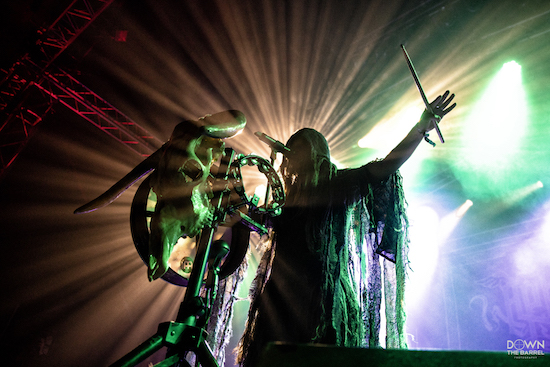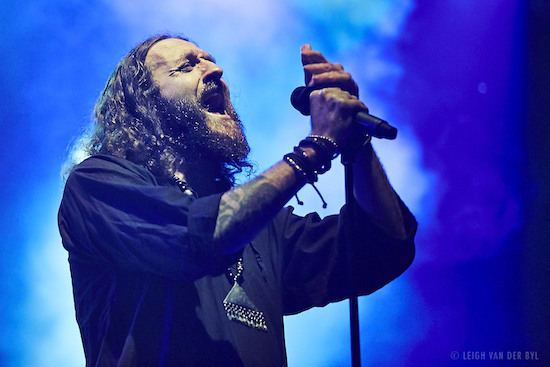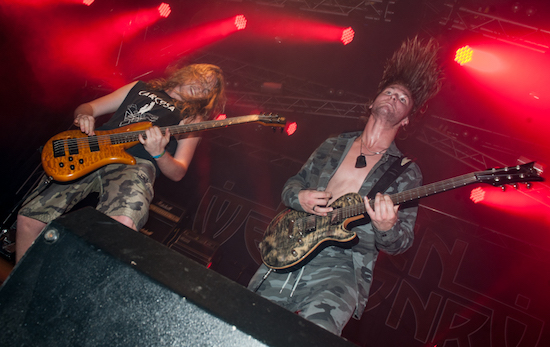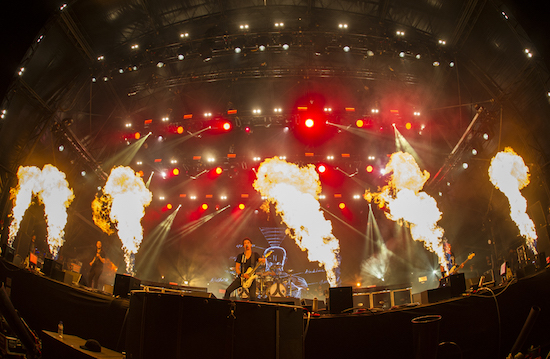Gojira photo by Katja Ogrin
One of the aspects of metal music that is not often remarked upon is its universality. While most other genres of music still tend to be heavily tied to the one country, state or even county in which their roots were originally laid down (if you want to hear a good argument for why this should generally remain the case, just listen the latest record from The Shires), the once distinctively British sound of heavy metal has spread its tendrils out around the planet, setting up a chapter in each new city it encounters like some kind of downtuned Trotskyist cult.
Nowhere is this world community of heavy more obvious than at Derbyshire’s Bloodstock festival. While there is, of course, an oversized contingent of acts from Britain and the USA, the burgeoning presence of bands from around the world is impressive for what is still just a four-stage event. Womad might have more pageantry and Peter Gabriel, but there is an argument to be made that Bloodstock and its brethren are just as much world music festivals as they are rock ones.
Besides West Brom’s finest exports Judas Priest, who do indeed deliver the goods on Friday, the headliners are Arkona (Slavic Russian folk metal), Gojira (environmentally conscious French death metal) and Nightwish (overblown Finnish power metal). Arkona kick things off on the Thursday evening with a spellbinding reminder that ‘folk metal’ doesn’t have to mean some twat on a tin whistle playing along to some hyperstylised symphonic nonsense, although Nightwish provide an ample enough filling of that when they close things up on the Sunday.
At its best, folk metal takes the unique sounds and techniques of the music from a performer’s homeland and marries them to the heart-stopping power of metal’s shuddering riff-and-drum assault to create something utterly new yet familiarly rendered. For Arkona, this means taking the traditional chants and repetitive flute melodies of Russian folk to create a trancelike version of metal that, by design, burrows itself deep into the listener’s head. ‘Goi, Rode, Goi!’ was still swimming around my brain during Pallbearer’s set a full three days of music later, a testament to the staying power of its inherited mechanisms for passing songs down through generations.

Arkona photo by Steve Dempsey
The unity and universality of the world’s metal community is remarked on by bands of all sizes, from tiny Manchester outfit Def Goldbum, whose Roots Manuva-meets-Biohazard take on rap-rock is actually worth your attention, to a visibly emotional ex-Hatebreed frontman Jasta (whose all-star rendition of Down’s chug-fest ‘Bury Me In Smoke’ with Fear Factory’s Dino Cazares, Killswitch Engage’s Howard Jones and Crowbar’s Kirk Windstein provides one of the most metal moments of the weekend).
But no band embodies metal’s mission for unity and coexistence better than Orphaned Land, who have been reverently grafting metal onto their own native musical traditions since long before System Of A Down made it cool to do so. An Israeli group whose lyrics (sung in Latin, Hebrew and Arabic) call for peace in the Middle East between all religions, the band make cunning use of Middle Eastern maqams and other non-western techniques to convincingly evoke the distinctive sound of their wartorn homeland in soggiest Derbyshire.

Orphaned Land photo by Leigh Van Der Byl
Frontman Kobi Fahri’s impassioned calls for a more tolerant society are enthusiastically received by the crowd of misfits and outcasts that populate the Sophie Lancaster stage, all of whom are aware of the story of the stage’s namesake and the dangers of social and political othering. That the band formed in 1991 and are still dealing with the same subject matter is a bitter indictment of people’s reluctance to change or channel their aggressive tendencies. If only we could get the Mossad and Iranian Revolutionary Guard to don Hawaiian shirts and do battle in the Cannibal Corpse pit (a popular Ace Ventura-inspired move at Bloodstock this year) then maybe we could leave the world a happier and more metal place for our grandchildren.
Alien Weaponry are one of the most exciting up-and-coming faces of modern metal at Bloodstock this year (alongside Texan thrashers Power Trip and Rugby band Conjurer). Hailing from Waipu, New Zealand, Alien Weaponry are a three-piece who formed eight years ago and are still teenagers. Brothers Lewis and Henry de Jong (frontman and drummer, respectively) are descended from the Māori tribes Ngati Pikiāo and Ngati Raukawa, and boy does it come through in their music.
Twinning slabs of groove metal with the Māori warrior tradition of the terrifying haka chant isn’t a new idea… oh, wait a minute, it absolutely fucking is. And it absolutely fucking works too. The Te Reo Māori tongue in which they largely perform takes to metal music like a Balrog to Moria, each guttural bark helping the song to gain momentum until it becomes an unstoppable behemoth of fiery energy.
Their audience might not all be aware of fact that the lyrics of ‘Raupatu’ concern the oppressive land laws of 1863 that allowed the New Zealand government to seize traditional Māori homelands, or the fact that the death of the de Jongs’ ancestor Te Ahoaho at the hands of the British is what inspired the passionate closer ‘Rū Ana Te Whenua’. What they are certainly aware of is the brute power of what they are witnessing, the satisfaction that comes from watching a great idea executed well, and the huge potential of this ridiculously young band. As the set ends, the fondly abbreviated chants of ‘Weaponry! Weaponry!’ that ring out across the festival echo the ‘Maiden! Maiden!’s and ‘Priest! Priest! Priest!’s of yesteryear.

Alien Weaponry photo by Katja Ogrin
Certainly, no one walked away from Alien Weaponry thinking that they’d just witnessed some top-notch folk metal. But they had, and across the weekend Bloodstock 2018 facilitated similarly intriguing (if generally less mindblowing) performances that presented regional variations on the common theme of metal. From Argentina’s Skiltron to Nepal’s Underside via India’s Demonic Resurrection, the most interesting and progressive bands tended to hail from overseas (which is not to say there wasn’t some great music being thrashed out on the Hobgoblin New Blood stage. Shoutouts to Democratise, Ethyrfield and Ashborne are most certainly in order).
All of which begs the question: what will happen to outward-looking festivals like this as obtaining travel visas for touring bands gets more difficult? Who will fight for the diversity and universal love of music which festivals like Bloodstock and its associated international festivals embody? Who will take on the mantle of The Metal Peter Gabriel? Raise your horns if it’s you.


